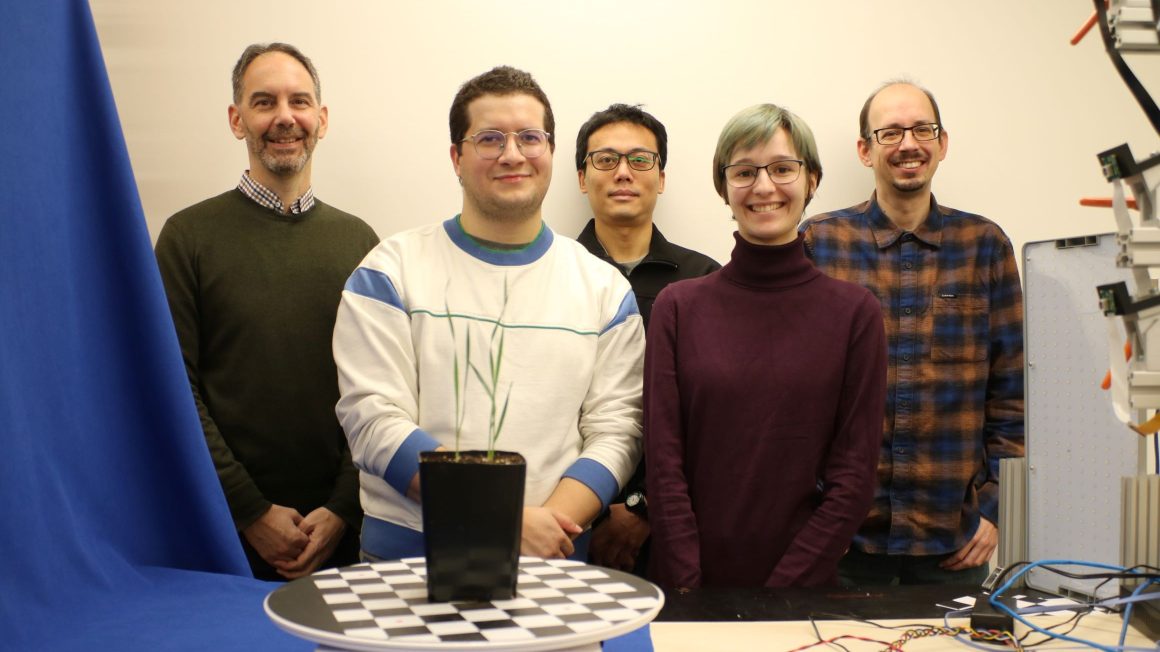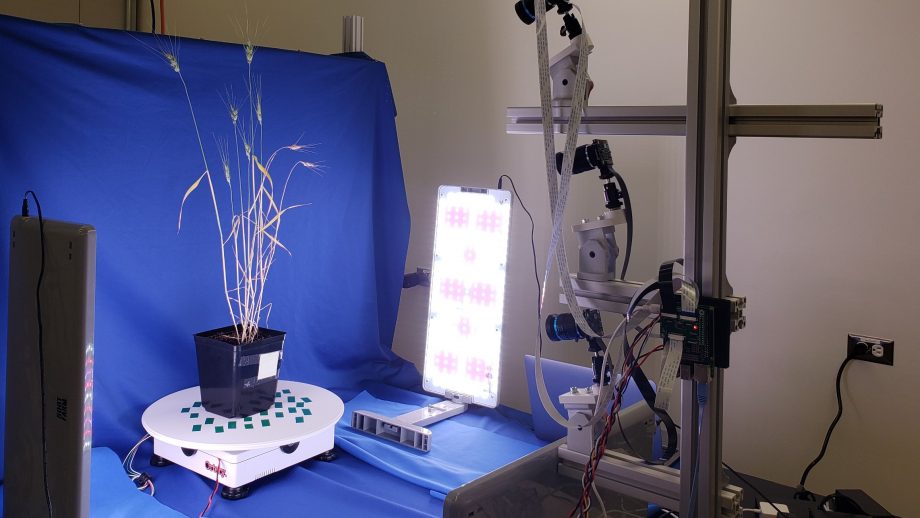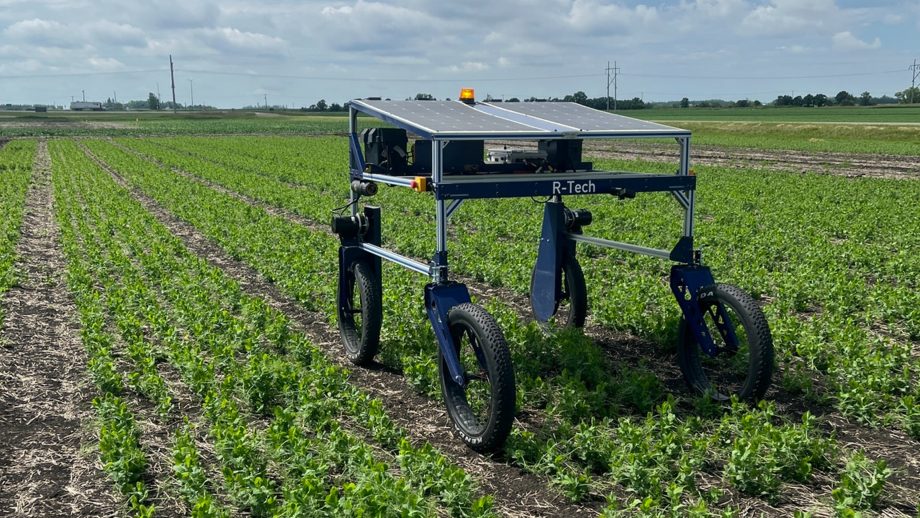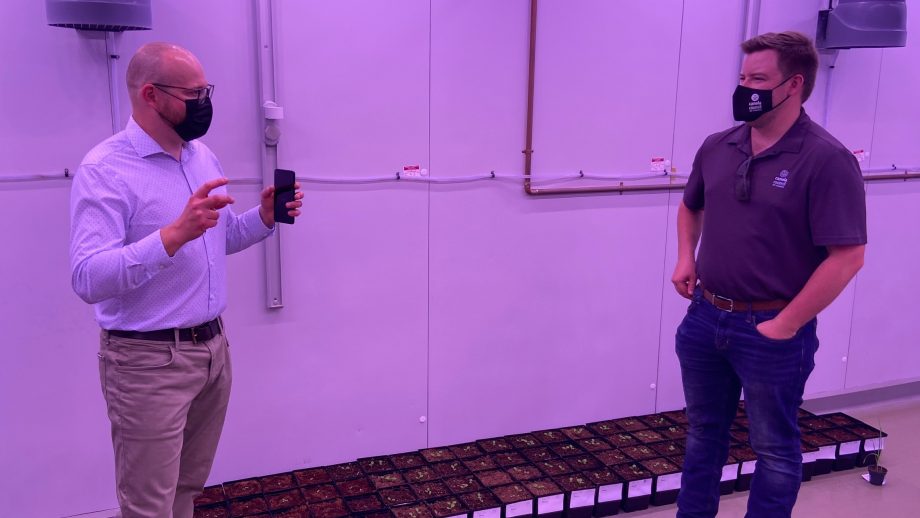If you picture a career in agriculture, physics probably isn’t the first thing that comes to mind. But as computers and technology rapidly change how we farm, a research team at The University of Winnipeg has found an unexpected niche in the growing industry of digital agriculture.
“It’s just so non-obvious to people that a physicist would have any business working in this field,” said UWinnipeg Physics Professor, Dr. Christopher Bidinosti, “but they are, and they’re doing really well.”
Studying physics at UWinnipeg and working at TerraByte taught me to solve real-world problems with technology.
Junyao Pu
Digital agriculture – using computers, technology, and algorithms in the ag industry – is common. Farmers already use tools like GPS and smart technology to enhance their operations. But using drones to spray fields, satellites to identify weeds, and even using AI or machine learning could soon be a regular part of a farmer’s day.
Although many big companies are working in this evolving industry, Dr. Bidinosti said UWinnipeg’s TerraByte project is unique because it’s research supporting research.
TerraByte, led by Dr. Bidinosti and Assistant Professor in the Department of Applied Computer Science, Dr. Michael Beck, combines physics research and computer science research to provide innovative solutions for plant scientists and plant breeders, who Dr. Bidinosti said are “desperate for new techniques.”
Many of the scientists TerraByte works with are looking for ways to automate data collection and increase the accuracy of their results. They typically collect data by making visual assessments of each plant.
“They don’t want to be doing it by eye anymore and estimating,” Dr. Bidinosti said.
With the help of TerraByte, plant scientists will regularly use robotic systems to collect data and machine learning to analyze what they find.
In the long run, this means farmers could more accurately manage pests and disease on their fields, and scientists could breed more resilient plants more quickly. It also means a new career path in digital agriculture is emerging.
“Every one of these things has a computational part to it that never existed before,” said Dr. Bidinosti. “That’s because of shrinking sensors, better sensors, better computing, and machine learning.”
This is where physics and computer science are key.
Real-world applications
When Alex Krosney (BSc[Hons] 2021) started studying physics at UWinnipeg, he never thought he would end up working in agriculture. Working on TerraByte changed that.
“Initially I planned to continue onto higher degrees in physics, and thought I would likely end up teaching or doing research,” Krosney said.
Now Krosney is working at JCA Technologies, an agriculture tech company, helping develop and implement algorithms for obstacle detection.
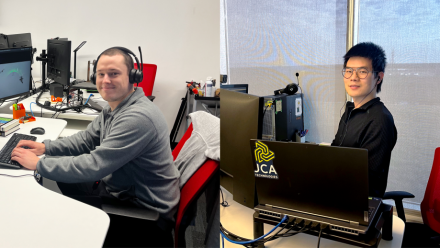
Alex Krosney (left) and Junyao Pu (right) are UWinnipeg physics grads now working in digital agriculture. Photos: supplied
“The greatest benefit to my career that a physics degree has provided me is the ability to understand complex math, but also to see math as a tool that I can use to solve real problems,” said Krosney.
Krosney isn’t the only UWinnipeg alumnus and former TerraByte researcher to be hired by JCA Technologies. Junyao Pu (BSc[HONS] 2019) currently analyzes farm data and creates artificial intelligence models for off-road vehicles at the ag tech company.
“Studying physics at UWinnipeg and working at TerraByte taught me to solve real-world problems with technology,” Pu said. “My physics background helped me think analytically, and now I use those skills in my career, using machine learning to find solutions to practical challenges.”
Pu says the research happening through TerraByte could help “revolutionize farming.”
“We might see smarter farms using technology to grow more food efficiently, adapt to environmental changes, and ensure a stable food supply for everyone,” he said.
With a changing climate and more aggressive invasive species, Dr. Bidinosti said improving plant research is integral to the future of agriculture. For TerraByte, that can’t happen without physics students.
“This coming digital ag space, and agriculture in general, is going to need a lot of people,” said Dr. Bidinosti. “What we need most are students with comfort in math, comfort in programming, and solid problem-solving skills, and those just naturally come out of the physics department.”
“If you’re thinking about a physics degree, go for it,” Pu said. “It’s a journey into understanding how things work. You’ll develop great problem-solving skills and open doors to cool jobs. Stay curious and enjoy the ride!”

